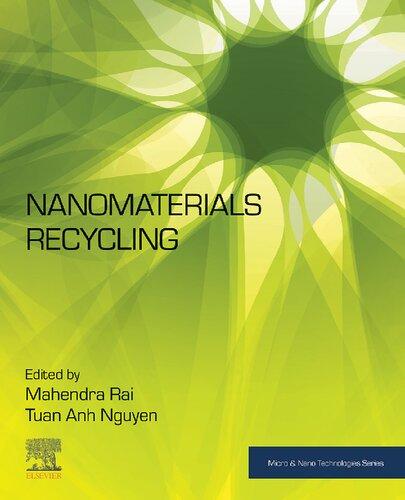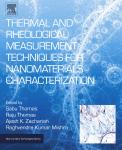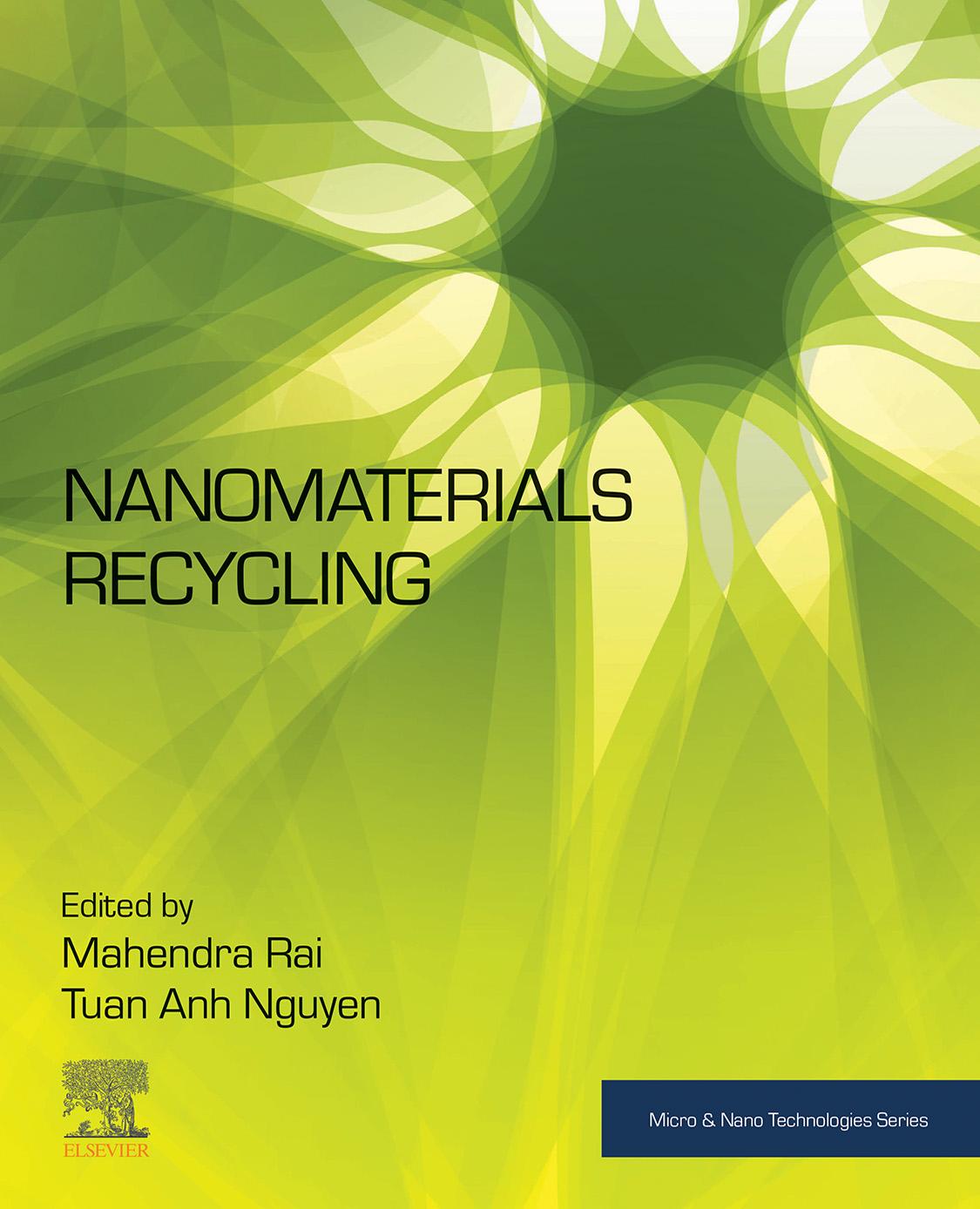SectionIIMethodsforrecyclingofnanomaterials
8.Generaltechniquesforrecoveryofnanomaterialsfromwastes147 KurayDericiler,IlaydaBerktas,SemihDogan,YusufZiyaMenceloglu andBurcuSanerOkan
Abbreviations 147
8.1 Introduction148
8.2 Typesofnanomaterialwastes149
8.2.1 Carbon-basednanomaterials150
8.2.2 Ceramic-basednanomaterials151
8.2.3 Metal-basednanomaterials152
8.2.4 Nanomaterial-reinforcedcompositematerials155
8.3 Typesoftechniquesusedfortherecoveryofnanomaterialsfromwastes157
8.3.1 Magneticseparationtechnique157
8.3.2 AntisolventtechniquebyusingCO2 160
8.3.3 Aqueousdispersiontechniques162
8.3.4 Colloidalsolventtechnique163
8.3.5 Centrifugation/solventevaporationtechnique163
8.3.6 Otherapproachesfortherecoveryofnanomaterials164
8.4 Conclusionsandoutlook165
References 168
9.Proceduresforrecyclingofnanomaterials:asustainableapproach175 AjitBehera,DeepakSahiniandDineshPardhi
9.1 Introduction175
9.1.1 Nanomaterialsposingriskstohumansandenvironment179
9.2 Classificationofnanowaste183
9.3 Typicalsafetyguidelinesforhandlingnanoparticles186
9.4 Disposalofnanoparticlewaste188
9.5 Variousprocessesfornanowasterecycling188
9.5.1 Physicalprocesses189
9.5.2 Chemicalprocesses190
9.5.3 Thermalprocesses194
9.5.4 Electrodepositiondepositionandelectrokineticprocess195
9.5.5 Sludgetreatmentprocess196
9.5.6 Microemulsionprocess197
9.5.7 Microbiologicalprocess197
9.5.8 Coagulationtechnique198
9.5.9 Nanoporousmaterialsandmembraneseparation198
9.5.10 Glucosereductionprocess199
9.5.11 Layer-by-layerassembling199
9.6 Variousnanowasterecyclingproducts199
9.6.1 Nanomaterialsinconcreteproduction199
9.6.2 Nanomaterialsappliedinsuspensions200
9.6.3 Low-costsensorsforenergystorageapplications201
9.7 Recyclingofnanocomposites202
9.8 Benefitsofnanomaterialsrecycling202
9.9 Limitationsofnanomaterialsrecycling202
9.10 Conclusions203
References 203
10.Recyclingofnanomaterialsbysolventevaporationand extractiontechniques209 Haleema,MuhammadUsmanMunir,Duy-NamPhanandMuhammadQamarKhan
10.1 Introduction209
10.2 Theimportanceofrecyclinginwastemanagement209
10.2.1 Classificationofwastes210
10.3 Nanomaterialsintheenvironment210
10.3.1 Recoveringnanomaterialsfromtheenvironment211
10.3.2 Recoveringnanomaterialsfromproducts212
10.4 Nanomaterialrecyclingtechniques213
10.4.1 Solventevaporationmethod214
10.4.2 Solventextractionmethod215
10.5 Recyclingofnanomaterialsviasolventevaporationandextraction216
10.5.1 Recyclingofnanomaterialsbysolventevaporationmethod216
10.5.2 Recyclingofwastebysolventextractionmethod218
10.5.3 Nanoparticlerecoveryusingamicroemulsion218
10.5.4 Nanoparticlerecoverybycloudpointextraction219
10.5.5 Recyclingnanoparticlesbyemployingacolloidalsolvent219
10.6 Potentialopportunitiesfortherecoveryandreuseofnanowaste220
10.7 Conclusion220
References
11.UsingpH/thermalresponsivematerials223
SoheylMirzababaei,KiyanaSaeedian,MonaNavaei-NigjehandMohammadAbdollahi
Abbreviations 223
11.1 Introduction224
11.2 pH-responsivematerials225
11.3 Thermoresponsivematerials226
11.4 Stimuli-responsivenanostructures227
11.4.1 Micelle228
11.4.2 Vesicle229
11.4.3 Polymerbrush230
11.4.4 Hydrogel230
11.4.5 Core-shellNP231
11.5 Applicationsinnanomaterialsrecycling232
11.5.1 Aqueoustwo-phasesystem232
11.5.2 Catalysts238
11.5.3 Adsorption240
11.6 Conclusions242
References
12.Nanomaterialsrecyclingstandards249
ArsalanAhmed,MuhammadFahadArianandMuhammadQamarKhan
12.1 Introduction249
12.2 Fundamentalofnanoparticles251
12.3 Classificationofnanoparticles252
12.3.1 Carbon-basednanoparticles253
12.3.2 Ceramicnanoparticles253
12.3.3 Metalnanoparticles253
12.3.4 Semiconductornanoparticles253
12.3.5 Polymericnanoparticles254
12.3.6 Lipid-basednanoparticles254
12.4 Scopeofnanotechnology254
12.5 Recyclingofnanomaterials255
12.6 Theimportanceofrecyclinginwastemanagement256
12.7 Usesofnanomaterials258
12.8 Usesofnanomaterialsinconsumerproducts258
12.9 Nanomaterialsandtheindustriestheyareusedin258
12.10 Categoriesofwastageofnanomaterials259
12.11 Nanowasteecotoxicologyandtreatment259
12.12 Wastegeneratedduringproduction260
12.13 Disposalandrecyclingofnanomaterialsinwaste262
12.14 Risksrelatedtonanomaterialsinwaste262
12.15 Nanomaterialsinrecyclingoperationsandpotentialexposure263
12.16 Nanotechnologyisdangerousforhumans264
12.17 Possibledangersofnanotechnology264
12.18 Conclusion265 References 266
13.Ionicliquidsfornanomaterialsrecycling269 HaniNasserAbdelhamid
13.1 Introduction269
13.2 Scopeofionicliquids270
13.3 Synthesisofionicliquids271
13.4 TypesofILs272
13.5 Recyclingionicliquid273
13.6 Theapplicationsofionicliquidsforrecycling276
13.7 Conclusions278 References 278
SectionIIIPropertiesofrecyclednanomaterials
14.Techniquesusedtostudythephysiochemicalpropertiesofrecycled nanomaterials291
VojislavStani ´ c
14.1 Introduction291
14.1.1 X-raydiffractionmethod291
14.2 Fouriertransforminfraredspectroscopy296
14.3 Ramanspectroscopy298
14.4 X-rayphotoelectronspectroscopy299
14.5 Augerelectronspectroscopy303
14.6 X-rayfluorescenceanalysis305
14.7 Scanningelectronmicroscopy306
14.8 Transmissionelectronmicroscopy308
14.9 Atomicforcemicroscopy309
14.10 Electronprobemicroanalysis312 Acknowledgments314 References 314
15.Mechanicalpropertiesofrecyclednanomaterials317 S.BehnamHosseini
15.1 Introduction317
15.2 Recyclingofnanomaterials318
15.2.1 Recyclingdefinitions318
15.3 Mechanicalpropertiesofrecyclednanomaterials324
15.3.1 Recyclednanoclay324
15.3.2 Recyclednano-CaCO3 324
15.3.3 Recyclednanosilver326
15.3.4 Recyclednano-zincoxide326
15.3.5 Recycledcarbonnanotubes326
15.3.6 Recyclednano-SiO2 327
15.3.7 Recycledlignocellulosenanofibers328
15.3.8 Recyclednanoalumina330
15.4 Conclusions331 References 332
SectionIVApplicationsofrecyclednanomaterials
16.Industrialscaleupapplicationsofnanomaterialsrecycling341 AjitBeheraandSumanChatterjee
16.1 Whyindustrial-scalerecyclingisrequirefornanomaterials341
16.2 Marketscenarioofrecyclednanomaterials343
16.3 Nanowastegenerationfromvariousindustriesandpractices344
16.3.1 Medicalindustries’ nanowaste345
16.3.2 Electronicindustries’ nanowaste346
16.3.3 Energy-harvestingindustries’ nanowaste347
16.3.4 Constructionindustries’ nanowaste347
16.3.5 Otherindustries’ nanowaste348
16.4 Potentialnanobyproductmaterials,theirrecovery,andrecycling349
16.4.1 Carbon-basednanobyproducts349
16.4.2 Metalnanobyproducts350
16.4.3 Metaloxideandnonmetaloxidenanobyproducts351
16.4.4 Polymernanobyproducts353
16.5 Nanowasterecyclingprocesses353
16.5.1 Mechanicalrecycling353
16.5.2 Chemicalrecycling354
16.5.3 Thermalprocessing355
16.5.4 Landfillingtreatment356
16.5.5 Microemulsionprocess356
16.5.6 Othermethodsofrecycling357
16.6 Summaryandfutureperspectives358 References 358
17.Recyclednanomaterialsforconstructionandbuildingmaterials363
P.O.Awoyera,C.O.NwankwoandD.P.Babagbale
17.1 Introduction363
17.2 Applicationofnanomaterialsinconstruction363 17.3 Nanomaterialsinconcretedesignanddevelopment364
17.3.1 Concrete364
17.3.2 Asphaltconcrete369
17.3.3 Otherbuildingapplications370
17.3.4 Healthimplications370
17.4 Conclusion371
17.5 Recommendations371 References 372
18.Nanomaterialsrecyclinginindustrialapplications375
MarjanHezarkhani,AbdulmounemAlchekhWis,YusufMencelogluandBurcuSanerOkan
Abbreviations 375
18.1 Introduction376
18.2 Currentproblemsinnanowastesustainabilityanditsmanagement377
18.2.1 Regulationsandstandardsfornanowastemanagement377
18.2.2 Identificationofrecoveredwastenanoparticlesbycharacterizationtechniques378
18.3 Recoveryofsustainablemetalsandinorganicnanoparticlesfromwasteforcatalytic andmagneticproperties380
18.4 Utilizationofrecyclednano-scaleandmicron-scalereinforcementsincomposite applications383
18.5 Thegrowthofnanomaterialsfromwasteplasticsbyanupcyclingprocess386
18.6 Recoveryandreuseofmetalnanoparticlesfromwasteelectroniccomponents388
18.7 Selectiverecoveryofmetalnanoparticlesbyusing α-cyclodextrin389
18.8 Nanomaterialsforenvironmentalcleanupapplications390
18.9 Conclusionsandpotentialoutlook391 References 393
Thispageintentionallyleftblank
Another random document with no related content on Scribd:
one should presume to extort more than this established amount, he shall not only lose his legitimate fee, but also he shall restore to the person from whom he received it, double the amount which he has extorted. The fees of both judge and bailiff shall be paid by the party against whom judgment is rendered; and if a case should occur where a settlement cannot be made, the legal compensation of the judge and the bailiff shall be required of both parties. The same rule shall apply to a debtor who did not return upon the appointed day, the money which he has borrowed; as well as to one who unjustly retains the property of another; and also, in cases of partition, where both parties demand their rights from the judge, it shall be required of each of them, that he pay to the court his portion of the fees aforesaid. And, likewise, where no crime has been proved; or no contempt, unlawful possession, or indebtedness have been established; this provision shall be in force, and the fees of the judge and the bailiff shall be paid by both parties.
In cases of partition, where one of the parties causes unnecessary delay; as soon as the fact shall come to the knowledge of the judge, he may exact his fee and that of the bailiff from him who has delayed to assert his claims within the specified time. If any corrupt bailiff should fail to execute an order of the judge, when the property involved is worth an ounce of gold, or less, the bailiff shall pay to him who is entitled to the judgment, a solidus of gold; and where the property is worth more, he shall pay for every ounce, a solidus, on account of his delay. And if the property in question should be worth more than two ounces, and not more than a pound of gold, said bailiff shall receive ten lashes, and the number of lashes shall increase with the number of pounds of gold.
If the cause or the party is of minor importance, and the bailiff must travel to perform his duties, he shall be entitled to two common horses, from the plaintiff, in addition to his fees. But if the cause should be important, and the party of high rank, the bailiff shall not be entitled to demand more than six horses for the purpose of his journey.
FLAVIUS RECESVINTUS, KING.
XXV. Every one who is Invested with Judicial Power shall Legally bear the Title of Judge.
As the remedies of the law are applied in many ways, it is decreed, that a duke, count, vicar, deputy, and any other official, who, either by the royal order, or by consent of the parties, has been, or shall be, selected to determine questions of law; or any person of whatever rank invested with the legal right to preside in court; as well as all to whom has been delegated the power to decide causes; shall be invested with the name of judge, and shall be entitled to the rights, and subject to the liabilities of that office, whether these relate to the emoluments or the penalties attaching to the same.
XXVI. Every Bond that is Exacted by a Judge, after an Unjust Decree, shall be held Invalid.
We occasionally find that justice is distorted, and deprived of its proper force, by unjust judges; and see injustice, confirmed by their decrees, prevail in its stead. And, indeed, certain judges after they have rendered unjust decrees, cause one or both the parties to bind themselves in writing, in order that the wrongful judgment that has been rendered may not at any time thereafter be remedied; but where such a transaction is not fair and honorable, but entered into with the manifest intention of oppressing any one whose cause is just, the matter may be reviewed; and all obligations relating thereto shall be declared invalid, and not, in any way, authorized by law.
FLAVIUS RECESVINTUS, KING.
XXVII. An Unjust Decree, or an Unjust Interpretation of the Law, Prompted by Fear of the Throne, or Made by Order of the King, shall be Invalid.
Sometimes the influence of power defeats the ends of justice, and although it often prevails, it is certain that it always inflicts injury; for, when the abuse of authority once causes oppression, it
never permits the restoration of justice to its original integrity. Therefore, as judges through fear, or at the command of princes, sometimes decide questions contrary to law, for the sake of the peace of our kingdom we have determined to cure two diseases with one remedy; declaring that when it should have been discovered that any document has been drawn up, or any judgment rendered, not according to justice or to the established laws, but by the command or through the dread of the king, then that which is evidently contrary to justice and to the laws shall be void; and those who have rendered the judgment or have caused it to be rendered, shall receive no mark of infamy, nor be subjected to any punishment whatever; and any judge shall be immune from the penalties of the law, if he will swear that he has decided wrongfully, not through his own depravity, but on account of royal compulsion.
FLAVIUS RECESVINTUS, KING.
XXVIII. Concerning the Power, conferred upon Bishops, of
Restraining Judges who Decide Wrongfully.
We direct the ministers of God, to whom the Divine authority has been committed to remedy the misfortunes of oppression and poverty, that they admonish, with paternal piety, such judges as oppress the people with unjust decrees, by which means such wrongs may be remedied. But if any magistrate, invested with judicial functions, has either decided unjustly, or has imposed a wrongful sentence upon any one, then the bishop in whose diocese this has been done, shall summon the judge who is alleged to have acted unjustly, and shall render a just decision, sitting along with him, in the presence of ecclesiastics, or other persons of respectability. But if the judge, moved by perversity, refuses to correct the iniquitous judgment given by him, after the bishop has exhorted him to do so, then the bishop shall have the privilege of reviewing the case, and of rendering judgment alone; and the wrongful decision of the judge, subsequently set aside by him, as well as his own decision, shall be committed to writing, and be deposited among the records of the court. The bishop shall so act
toward the party who has been oppressed, and liberated by him from that oppression, that truth may be established and confirmed by our authority. If the judge should prevent the party whom he has oppressed from appearing before the bishop, he shall forfeit two pounds of gold to the king.
FLAVIUS CHINTASVINTUS, KING.
XXIX. The Judge, when Inquired of by a Party, should be able to give a Reason
for His Decision.
Every judge is hereby admonished that if a demand is made upon him by any one, he shall give the reasons, in their proper order, for the decision he has made; and this he shall do, either in the presence of the governor of the city, or of those whom the governor has chosen to represent him. And if the matter has been brought before the king, those judges whom the king shall appoint for the purpose, shall decide the cause, without the presence of the bishop and the other judges. And if, after the action has been brought to an end, either before the bishop or before the governor, either of the parties should present himself, a second time, with the royal order, he who heard or decided the cause in the first place, must account for his conduct to those who have been specially appointed judges by the royal decree; so that in case he should be found to have rendered an improper decision, he may give satisfaction therefor to the plaintiff before the law. And if the plaintiff shall have filed an unjust complaint, he shall be condemned to suffer the legal penalty prescribed for the same.
FLAVIUS RECESVINTUS, KING.
XXX. Concerning the Punishment of Judges who Appropriate the Property of Others.
While it is evident that judges have been appointed for the purpose of remedying evils, some of them, on the other hand, with all the insolence of power, attempt to attack those very things which, according to the principles of equity, they ought to defend. For, once invested with authority, some judges do not hesitate to assume
illegal control over the property of others; and do not fear, under almost any pretext, to subject them to unreasonable expense in the exercise of official tyranny. Henceforth, any judge who shall take any property belonging to another, contrary to an order of court, or in violation of law, or shall injure said property in any way, shall be condemned to suffer the same penalty which he, acting in his judicial capacity, would have imposed upon any one guilty of the same offence.
FLAVIUS RECESVINTUS, KING.
XXXI. Concerning those who Treat the Royal Order with Disdain.
Any freeman who shall have been convicted of having disobeyed the royal summons, or shall have been proved to have acted in such a manner that his duplicity is apparent, and shall say contrary to the truth, that he has neither seen nor received the summons; if he is a person of noble birth, he shall pay three pounds of gold to the treasury; but, if he should not have sufficient property to pay this fine, he shall receive a hundred lashes with the scourge, without any degradation of rank. But if he should have been prevented from travelling by sickness, tempest, inundation, or snow, or by unavoidable trouble of any kind, and this should be established by the testimony of reliable witnesses, he shall not be considered guilty of disobedience to the royal order, or be liable to any punishment, as it is evident that the delay was the result of manifest necessity.
XXXII. How the Judge should Inquire into Causes by the Ordeal of Hot Water.
We are aware that many persons assert that they have received injuries at the hands of freeborn citizens; and it is our opinion that torture should be applied in such instances, where an amount exceeding three hundred solidi is involved; and we now declare this to be a salutary measure, and decree that whenever crime has been committed by any one, where a small amount of property is concerned, the ordeal by hot water be instituted by the judge; and
should the accused appear to be guilty, the judge shall not hesitate to put him to the torture, and after confession has been obtained, he shall inflict upon the criminal the sentence of the law provided in such cases. If, after the test, he should prove to be innocent, his accuser shall incur no reproach whatever. This test shall also be applied to suspicious persons who present themselves in court to give testimony against others.[8]
TITLE II. CONCERNING CAUSES.
I. No One can Refuse to Answer because the Plaintiffhas Never Presented his Claim to Him.
II. The Court mustbe Disturbedby no Clamor or Tumult.
III. Where there are Many Litigants, Two may be Chosen who shallhave Power to carry on the Suit.
IV. BothParties may be Compelledby the Judge, or the Bailiff, to be Present in Courton the Day when the Case is to be Heard.
V. Those whose Affairs have been broughtbefore a Tribunalfor a Decision, shall, under no Circumstances, enter into a Compromise before the Case has been Decided.
VI. BothParties shallbe Requiredto FurnishTestimony.
VII. Concerning the Journey whichany one Compels an Innocent Person to Make.
VIII. Where any one Residing in the Districtofone Judge has a Cause of Actionagainsta Party Living in the Districtofanother Judge.
IX. Concerning Those who Venture to Defendthe Suits ofOthers.
X. No Freeman shallRefuse to Answer the Slave ofanother in Court.
FLAVIUS RECESVINTUS, KING.
I. No One can Refuse to Answer because the Plaintiff has Never Presented his Claim to Him.
No one can interpose a defense to the action of any plaintiff by saying that the latter has no right to bring a suit, because he has not made formal demand upon him for his claim, unless he can show that the time within which the suit may be brought, has expired.
FLAVIUS CHINTASVINTUS,
KING.
II. The Court must be Disturbed by no Clamor or Tumult.
The court shall not be disturbed by any tumult or clamor whatever; those who have no interest in the case shall be compelled to withdraw; and only such as are known to be concerned in the proceedings shall come into the presence of the court. But if the judge desires spectators to be present, he can permit it, in case he should wish to confer with them about the case. But if he should be unwilling, no one shall be allowed to enter the court room, either to
aid one party by improper suggestions, or to interpose objections to the conduct of the other, whereby either party may be unnecessarily annoyed. And if any one, having been admonished by the judge to be silent, should not obey, nor desist in his attempts to aid either party, and should, in defiance of this warning, continue to interfere, he shall be compelled to pay ten golden solidito the judge. And if he should still persist in his conduct, he shall be unceremoniously ejected from the court.
III. Where there are Many Litigants, Two may be Chosen who shall have Power to carry on the Suit.
If the litigants are more numerous on one side than on the other, both sides, in turn, shall select from their number, parties to carry on their case. For all ought not to participate in the conduct of the action, but, as we have said, those chosen by both sides should alone appear in court, so that all noise and confusion may be avoided.
FLAVIUS CHINTASVINTUS, KING.
IV. Both Parties may be Compelled by the Judge, or the Bailiff, to be Present in Court on the Day when the Case is to be Heard.
Often, through the negligence of the judges or the bailiffs, when security is not required of the parties, one or the other of them unnecessarily suffers inconvenience or injury. For when one party is present in court, and the other is absent, no little expense is often incurred by the former. Therefore, we decree that all judges, and all upon whom judicial power has been conferred, whenever the time arrives in any suit for the giving of security; or when a cause is about to be heard, or settlement to be made; both parties, that is the plaintiff as well as the defendant, shall be required to give bond, that, upon the day appointed for trial, either in person, or by representatives, they shall be present in court, in order that the case may be heard, or the claim otherwise disposed of; and if either party should refuse to come, and absent himself upon the appointed day;
or if sickness, or any accident during his journey, should prevent him from coming; and he should not communicate the fact to the judge or his attorney; and should not appear in court within the time prescribed by law, and the case should be delayed on that account; he shall pay the amount of the bond to him before whom he entered into the obligation. And if either the judge or the bailiff should neglect to exact security from both parties, as aforesaid, and, while compelling one party to give bond should excuse the other, he shall pay out of his own property, a sum equal to that for which he wished to make him liable whom alone he placed under bond. And if, to the injury of either party, the judge or the bailiff should restore to one the undertaking which he had exacted from the other, or should destroy or conceal it, he shall pay him on account of whom the bond was executed, out of his own property, a penalty equal to that which was inserted in the bond.
He who brought the suit may then insist that it be carried on without further delay. The penalty, although declared in the bond to be payable to the judge or the bailiff, shall not entirely belong to them; but, after the case has been decided, they shall be entitled to half of said penalty, and the other half shall be given to the party who gains the suit.
V. Those whose Affairs have been brought before a Tribunal for a Decision, shall, under no Circumstances, enter into a Compromise before the Case has been Decided.
If cases are not permanently disposed of by the temperate decision of the judge, not only do great difficulties arise in settling the disputes of litigants, but the course of justice is often interfered with, through the irreconcilability of adverse claims; for many persons, after they have brought their disputes before the royal tribunal to be finally determined, in order to avoid the legal penalty for their conduct, settle, by agreement between themselves, the cause which they have brought to the hearing of the king. Lest, therefore, any party by means of such a fraud may escape the justice of the court, we decree, by this law, that whoever, hereafter,
shall apply to the royal tribunal for the determination of his case against another, shall, under no circumstances, absent himself, or make any compromise with his adversary, but shall prosecute the cause already begun until the king shall have given a decision in the matter. And, if either plaintiff or defendant should neglect to carry on the action before the king, or before those whom he has chosen to hear it, or should enter into any arrangement with the other party, each shall pay to the Crown the sum which he who filed the petition, could have obtained, had he gained the suit; and whatever shall be thus obtained by the king in this proceeding he can dispose of at his pleasure. All those shall be liable to a similar penalty, who seek to have their disputes settled by a judicial decision, and, after the cause has been begun, refuse to proceed with it and presume to compromise with one another.
The judge and the bailiff shall have the right to divide the aforesaid penalty between them. But if the parties should not have sufficient property to pay said penalty, each shall receive one hundred lashes with a scourge, and the judge shall terminate the suit forthwith. We decree, however, that those shall be free from the operation of this law to whom the royal mandate was especially directed, as well as those whom the judge, who heard the cause, shall have dismissed, after a settlement has been effected with his consent.
FLAVIUS CHINTASVINTUS, KING.
VI. Both Parties shall be Required to Furnish Testimony.
Whenever a cause is heard, both parties, that is, plaintiff as well as defendant, shall be required to produce evidence, and the judge shall decide which side is entitled to a decree. But if, after the testimony has been taken, the truth does not appear to have been established, the defendant shall declare under oath that the property in question, if any has been demanded of him, has never been, and is not now, in his possession, and that he is not aware of any reason why he should be sued, and that he truly does not know that he has done anything to render him liable, in any way, to the party who
complains of him, and after the defendant has thus made oath, the plaintiff shall be compelled to pay him five solidi.
FLAVIUS RECESVINTUS, KING.
VII. Concerning the Journey which any one Compels an Innocent Person to Make.
All those whose innocence is established, should be free from injury, and exempt from annoyance by unprincipled men. Henceforth, whenever any one shall cause another to be wrongfully summoned before the king, or brought, without cause, before a court; as soon as it has been proved that the claim of the plaintiff was not well founded; if the party has, in obedience to a summons, been compelled to come fifty miles, or less, he shall receive from the plaintiff five solidi, on account of the unjust demand by the latter. If he has been forced to come a distance of sixty miles, the unjust plaintiff shall pay him six solidi; and so on, the number of solidi increasing at the rate of one for every ten miles; and, for the distance of one hundred miles, ten solidi shall be given by said plaintiff to him who has been subjected to annoyance and trouble; and thus the number of solidishall increase as aforesaid, in the ratio of five for every fifty miles, and ten for every hundred miles; the amount of pecuniary satisfaction being always proportionate to the length of the journey.
FLAVIUS CHINTASVINTUS, KING.
VIII. Where any one Residing in the District of one Judge has a Cause of Action against a Party Living in the District of another Judge.
If any freeman or slave has a cause of action against anyone residing outside of the province in which he lives, and within the jurisdiction of another judge, the judge of the district to which the plaintiff belongs shall send a letter under his signature and seal, to the other judge, and direct him to hear the cause of the complainant, without delay; and if he should neglect or deny this request, then the judge in whose district the plaintiff resides, shall
seize as much of the property belonging to the judge to whom he sent the letter, as the sum amounts to, concerning which the plaintiff brought the suit; wherever he can find said property in his jurisdiction; which property, however, must not be delivered into the possession of the plaintiff. And he who receives it shall hold it, so that, when the case has been disposed of, the costs and expenses may be paid out of the income derived from the same. If the judge who, on the reception of the letter from the other judge, refused to hear the cause of the plaintiff, should afterwards conclude to do so, such property of his as was seized by the former judge, shall be restored to him without delay; but none of the amount which has been expended for reasonable costs shall be returned. And if, after the case has been decided according to the rules of justice, the judge shall be found to have lost anything by reason of the unjust demands of the plaintiff, then the latter shall make full restitution to the said judge, and shall be compelled to pay him in addition, an equal amount from his own property. And if that judge who was the cause of the delay, has no property, in the jurisdiction of the other judge who notified him, wherewith to reimburse the plaintiff, the latter judge may seize the property of the former, wherever he can find it, even when it is not in his jurisdiction; or he may deliver to the plaintiff a memorandum under his seal, in which the amount of the sum involved is set forth, by authority of which the plaintiff may have the power to seize said property.
If one whose property was illegally taken for a debt should complain of this to the king, the judge, or the governor; a judge convicted of unnecessary delay in hearing the case, shall pay all damages incurred, and four times their amount besides, out of his own purse. But if a creditor should privately accept from his debtor, a sum equal in value to the amount of property involved, the judge cannot be required to give satisfaction as above stated. If the judge who was notified should hear the cause of the plaintiff without delay, and should find that there is no justice in his claim, he must send a copy of the decree in writing, carefully made out, and signed with his hand and sealed with his seal, to the judge by whom he has
been notified, as hereinbefore stated. And if, after the decision, the wrong-doing of him who made the claim should appear; if he is a freeman, he shall pay double the amount of the property involved, that is, a sum equal to what the other party lost, and as much more. Any slave who shall have been detected in the commission of such acts, shall receive one hundred lashes with the scourge; shall be scalped as a mark of infamy; and shall at once restore the entire amount of property which he had seized, as security.[9] And all concerned in the seizure, if they are slaves, and did so willingly, shall each receive a hundred lashes; but if they are freemen, they shall restore to the owner as much as they are proved to have taken from him, without the sum usually given as indemnity by him who has been convicted of having acted wrongfully in similar cases.
IX. Concerning Those who Venture to Defend the Suits of Others.
Whoever has recourse to a person of high rank or influence, that, through his aid in court, he may be able to oppress his adversary, shall lose his case, even though his cause be just; and as soon as the judge perceives that any powerful person is interfering in a case, he shall order him to desist. But if the said person should defy the judge, and, obstinately resisting, should refuse to leave the court, or to cease interfering with the proceedings, the judge shall have authority to fine him two pounds of gold, one of which shall be for his own benefit, and the other for the benefit of the party injured by the said powerful adversary, and the latter shall be violently thrown out of court. Any freeman or slave who refuses to desist from interference with the business of the court, after having been warned by the judge, shall receive fifty lashes with the scourge, in public.
FLAVIUS CHINTASVINTUS, KING.
X. No Freeman shall Refuse to Answer the Slave of another in Court.
In order that insolence may be the more easily punished, the law regards excuses as superfluous. Sometimes freemen do not hesitate to injure the slaves of others, and then refuse to answer the petition of a slave in court; declaring that they should not be compelled to answer any one from whom they cannot collect damages, if they should chance to be victorious. But lest, through this delay, the slave himself should unjustly suffer injury; though his master should be distant fifty miles, or any objection should be made by his master on account of his employment at the time; after due deliberation, we hereby decree that a hearing shall be denied to no one. If, however, a slave should assert that he has any claim of his own, or any business to transact in court on behalf of his master or mistress, he against whom he files a complaint, shall straightway be compelled to appear and answer; and, in the end, make such compensation as is authorized by law, if he be vanquished by the slave; but if the slave is unable to prove what he has adduced, then the freeman shall declare under oath that he has no knowledge of, nor has in his possession, the property to which claim is made; nor has done, nor has caused to be done, any of those things of which he is accused. And, after this oath has been taken, the slave or the freeman, as the case may be, must not delay to make amends for filing his unjust complaint. But if, in the settlement of these damages, where the claim is for a small amount, it should appear that his master is only worth ten solidi, the slave shall be compelled to pay only half the penalty, that is to say, two half solidi. But if it should appear that the master of the slave is distant less than fifty miles, his slave cannot bring an action against any freeman, unless the master is unable, in person, to be present in court; or should send a letter, written in his own hand, and signed with his signature, authorizing the slave to appear for him, by the latter as messenger to the judge.
If the slave, acting on behalf of his master, should cause him any injury, either through fraud or neglect, or should lose the case, it shall be lawful for the master to have it reviewed, either upon his own application, or upon that of a lawful representative, and have it
justly decided by the testimony of such witnesses as he may be able to produce.
TITLE III. CONCERNING COMMISSIONERS AND COMMISSIONS.
I. Princes andBishops shouldnotConducttheir Cases in Court in Person, butthroughtheir Subjects or Subordinates.
II. The Judge must inquire ofa Litigant, whether the Suitbroughtby Him is his Own, or thatofAnother.
III. He who cannotConduct his Cause Himselfmustgive Written Authority to his Attorney.
IV. Torture shall, in no Case, be inflictedupon Persons ofNoble Birthwho are acting as Representatives ofOthers; and, In what way a Freeman ofthe Lower Class, or a Slave, may be subjectedto Torture.
V. IfHe who has Appointedan Attorney Suffers Delay, he can Revoke his Commission.
VI. Itshallnotbe Lawfulfor a Woman to Actas an Attorney, butShe may Conduct Her Own Case in Court.
VII. The Constituentshallreceive the Benefit, andbear the Loss, resulting from Proceedings Institutedby his Attorney.
VIII. Ifa Representative shoulddie, his Heirs shallbe entitledto his Fees.
IX. What Persons those in Power, andthose thatare Poor, mayappointto Conducttheir Cases.
X. Those who have Charge ofthe RoyalTreasury, when the Suit is brought for its Benefit, have authority toappoint whom they wishto represent them.
FLAVIUS RECESVINTUS, KING.
I. Princes and Bishops should not Conduct their Cases in Court in Person, but through their Subjects or Subordinates.
As it is the office of persons in power to decide questions of law, and as, in many instances, they should not be needlessly subjected to the annoyances resulting from litigation; therefore, if either the king or a bishop should have a lawsuit with any one, he may select a personal representative to whom the transaction of the business shall be intrusted; for the reason that it would seem an insult to the dignity of persons of such high rank, if those of a lower class should contradict their evidence in court. And again, if the king should choose to personally assume the conduct of his case in any matter, who is there who would dare to contradict him? Therefore, lest the
fear of royal power should suppress the truth, the case should be conducted, not by the king, but by some of his subjects.
II. The Judge must inquire of a Litigant, whether the Suit brought by Him is his Own, or that of Another.
The judge must, in the first place, make inquiry of a litigant whether he is conducting his own case, or that of another. He shall also be asked whom he represents; and, after the judge has decided the case, he shall include in the decree him by whose order the action was prosecuted, and, in addition, he shall receive a copy of the authority of the representative, to be filed with the record of the judgment. And it shall be lawful for the defendant to examine the commission given by the plaintiff, in the presence of the judge, so that he may know, without doubt, for what reason he was brought into court, as well as ascertain the contents of the order granting the authority.
III. He who cannot Conduct his Cause Himself, must give Written Authority to his Attorney.
If any one is unable to conduct his own cause, or is unwilling to do so, he must appoint a representative, by an instrument in writing, under his own hand, confirmed by the seals and signatures of witnesses. And if any such representative should be guilty of collusion with his adversary, so that he is defeated, he shall pay to his principal, as much of his own property as the latter has lost, or as much as he ought to have obtained. But it shall not be lawful for a slave to conduct any case whatever, through the commission of another, unless on behalf of his master or mistress, or of the Church, or of some poor person, or under the commission of the royal treasury. If, through either the neglect or misconduct of the judge, or through the perjury of a witness, the provisions of this law should not be carried out, then it shall be the duty of the king to enforce the same.
FLAVIUS CHINTASVINTUS, KING.
IV. Torture shall, in no Case, be inflicted upon Persons of Noble Birth who are acting as Representatives of Others; and, In what way a Freeman of the Lower Class, or a Slave, may be subjected to Torture.
No person of noble rank shall, under any circumstances, be put to the torture by authority of a commission given to another. It is, however, hereby permitted that any freeborn person of low rank who is poor, and has already been convicted of crime, may be tortured under such a commission; but only when the principal gives authority in writing to do this, signed by him, and attested by three witnesses, which shall be entrusted for delivery, to a freeman, and not to a slave. And if he should cause the torture to be inflicted upon an innocent person, the aforesaid principal is hereby admonished, that he has incurred the penalty of the law which is found in the sixth book, first title, second chapter; wherein it is stated for what things freeborn persons are to be put to the question. It is lawful for other criminal causes to be prosecuted under commission; and, as has been said above, tortures may be applied to a freeman by the representative of another who is also free. And it is granted by the law to a freeman or a slave, to subject a slave to torture, with this provision, to wit: that if either torture or injury should be inflicted upon an innocent person, the principal shall be compelled to give complete satisfaction, under the instructions of the judge. Nor is he to be discharged who received the commission, until either the principal may be produced in court, or shall make amends according to law. And whoever desires to inflict the torture, having received authority to do so under a commission, shall be compelled by the judge to give bond.
V. If He who has Appointed an Attorney Suffers Delay, he can Revoke his Commission.
He who conducts a case as the representative of another should proceed with it as rapidly as possible; and if he is dilatory, and the case which should have been prosecuted with alacrity, is retarded unnecessarily, or is fraudulently postponed, the principal may have
recourse to the judge. And if he who receives the commission to conduct the case should, through malice or corruption, cause delay for ten days after he has received the order of the judge to proceed with the same, the adversary or the judge being present, then the principal can either conduct the case himself, or appoint any one else whom he may select, to conduct it for him.
ANCIENT LAW.
VI. It shall not be Lawful for a Woman to Act as an Attorney, but She may Conduct Her Own Case in Court.
No woman can conduct a case under the authority of another, but she is not forbidden to transact her own business in court. Nor can a husband conduct the case of his wife without authority from her; and, indeed, he should protect himself with such an instrument in writing, that the wife may not repudiate the whole proceeding; and if she should repudiate it, the husband shall undergo the penalty to which he is liable who presumed to conduct a case without the authority of his wife. And if the husband should lose a case which he prosecuted without the order of his wife, her rights shall in no way be prejudiced; and she can afterwards either prosecute the case herself, or can authorize any one she wishes to do whatever is proper in the matter. And if the case should justly go against the husband, and the wife should believe that the adversary who prevailed should again be sued; and, after the second trial, it should be apparent that her husband was not unjustly beaten in the first trial, the wife shall render satisfaction as prescribed by law, not only to the judge who first heard the case, but also to the other party whom she brought into court for the second time.
ANCIENT LAW.
VII. The Constituent shall receive the Benefit, and bear the Loss, resulting from Proceedings Instituted by his Attorney.
He who authorizes a case to be conducted by another as his attorney, shall enjoy the profit, or endure the loss resulting from the
same, according to the circumstances; and he who carried on the action in compliance with his instructions, and exerted himself faithfully in the performance of his duty, shall not be deprived of his commission by his constituent; nor shall the latter be permitted to afterwards transfer the conduct of the case to another; because it is unjust that he who is known to have labored faithfully in the business which he has undertaken, should be deprived of his reward. He who is about to assume the conduct of a case should have an understanding with his constituent beforehand, and ascertain what amount he is to receive as a recompense for his services after the cause has been decided. And if he who conducted the case shall neglect to deliver to his constituent, within three months, any property which came into his hands under the decree, he shall lose the compensation for his services which he would otherwise have received; and shall be compelled by order of court to deliver to his constituent, whatever he was entitled to under the decision.
VIII.
If an Attorney should Die, his Heirs shall be entitled to his Fees.
Where any person authorizes another to conduct a case for him, and dies before it is heard, said authority shall determine; and if he who received it should be surprised by death before the cause is heard, then also the order addressed to him before his death shall have no validity. But if the cause has been heard and energetically prosecuted through his diligence, and yet, for some reason or other, it was not entirely concluded, or some payment should remain to be made before final settlement; and if the case has been prosecuted as far as he who was commissioned to conduct it should have carried it; then, his heirs shall be entitled to receive from the constituent whatever compensation their ancestor would have been entitled to.
FLAVIUS CHINTASVINTUS, KING.
IX. What Persons those in Power, and those that are Poor, may appoint to Conduct their Cases.
It shall not be lawful for any one who selects an attorney to conduct his case, under any circumstances, to appoint a person who is more powerful than himself, so that the capacity to oppress, or terrify, may be greater than his own. For if a powerful person should be involved in a lawsuit with one who is poor, and is unwilling to conduct it himself, he cannot appoint any one else to carry it on but one of equal standing with, or perhaps inferior to, the other party. But, on the other hand, if a poor man chooses, he may select as his attorney any one of equal rank and power with his adversary.
FLAVIUS CHINTASVINTUS, KING.
X. Those who have Charge of the Royal Treasury, when a Suit is brought for its Benefit, have authority to appoint whom they wish to represent them.
Nothing should be done rashly in matters relating to the royal treasury. And whenever it appears advisable to proceed against any one on behalf of the treasury, he who is charged with that duty shall have the right to conduct the case before either the governor of the city, or the judge. If, however, he should happen to be absent from the place where the business is to be transacted, or should be prevented by any accident, or even should be unwilling to appear in his own person, he shall have the unquestionable right to appoint any one he chooses, to bring an action in which the public interests are involved.[10]
TITLE IV. CONCERNING WITNESSES AND EVIDENCE.
I. Concerning Persons who are not Permittedto Testify.
II. Witnesses shallnot Testify exceptunder Oath; Where bothparties offer Witnesses whichshouldbe Believed; andWhere a Witness Testifies Falsely.
III. Where a Witness Testifies Orally, andWritten Evidence Contradicts Him.
IV. ASlave shallnotbe Believedunless he Belongs to the Crown; andWhen RoyalSlaves shallbe Believed.
V. AWitness shallnotgive His Testimony in Writing, butOrally, andHow Testimony shouldbe Given.
VI. Concerning Those whogive False Testimony.
VII. Concerning Those who are Provedto havegiven False Testimony; and Concerning the Space ofSix Months in whicha Witness may be DeclaredInfamous. Itshallnotbe Lawfultogive Testimony concerning One who is Dead.
VIII. Concerning Those who Induce Others togive False Testimony; or Encourage the Slaves ofOthers to Seektheir Liberty.
IX. In whatCauses Slaves can Testify.
X. Concerning Those who Bindthemselves in Writing, nottogive True Testimony in the Causes ofOthers.
XI. At what Age Minors can Testify.
XII. ANear Relative, or a Kinsman, ofa Party to a Suit, cannotgive Testimonyagainsta Stranger.
FLAVIUS CHINTASVINTUS, KING.
I. Concerning Persons who are not Permitted to Testify.
Murderers, malefactors, thieves, criminals, poisoners, ravishers, perjurors, or those who are addicted to the practice of sorcery or divination, shall under no circumstances be permitted to testify.
II. Witnesses shall not Testify except under Oath; Where both parties offer Witnesses which should be Believed; and Where a Witness
Testifies Falsely.
The judge, as soon as the cause is heard, the witnesses having been sworn according to law, shall render judgment. No witnesses shall be permitted to testify without having first been sworn. If evidence should be offered by both sides, its weight shall be duly
considered, and the judge shall determine on which side it preponderates.
If any one, after having been warned by the judge, should refuse to testify concerning any matter within his knowledge; and should either say that he does not know the facts, and hesitates to take the oath, or should suppress the truth through favor to any one, or through bribery; if he is a person of noble rank, he shall not be permitted to give testimony afterwards in any cause in court, nor shall his testimony be taken in any proceeding whatever. But if he who refuses to testify, should be an ordinary citizen, or a person of inferior rank, he shall be considered infamous, and shall receive a hundred lashes; because it is no less criminal to suppress the truth, than to commit perjury.
FLAVIUS CHINTASVINTUS, KING.
III. Where a Witness Testifies Orally, and Written Evidence Contradicts Him.
Whenever a witness testifies to something contrary to what is contained in any document, which he is known to have signed, although he may directly contradict the text of the document, the latter shall be preferred as evidence. But if witnesses should testify that the document offered is not valid, he who introduced it must confirm it by the testimony of witnesses; and if he cannot prove it by them, and by the production of other documents, the judge must require the witness who denies that it is in his hand, to write a similar document, in order that the truth may be the more readily established. And the judge shall make every effort to find other documents which may be compared with the one in question. And if all these efforts should fail, he shall not delay to make the witness swear that he had never signed the document; and if, afterwards, in any way it should become evident, that the latter had lied for the purpose of suppressing the truth, he shall be branded with the mark of infamy; and, if he is a person of high position, he shall be compelled to pay, by way of satisfaction, to the person affected by his false testimony, double the sum which the latter would have lost.
[11] But if he is a person of inferior rank, and has not sufficient property wherewith to make amends, he shall never again be allowed to testify, and shall receive a hundred lashes with the scourge.
In regard to the two credible witnesses, whose evidence the authority of a former law declared should be received as sufficient; it must be required, not only that they should be reputable, that is, unquestionably freemen, but also of honorable rank and possessed of property. For care must be taken lest any one oppressed by poverty, and unable to bear his privations, should, without due reflection, perjure himself.
FLAVIUS CHINTASVINTUS, KING.
IV. A Slave shall not be Believed unless He Belongs to the Crown; and When Royal Slaves shall be Believed.
A slave is not to be believed at all if he should try to prove any one else guilty of crime, or if he should endeavor to implicate his master in any offence. And even if he should be subjected to torture, and should confess what he has done, still he must not be believed; an exception, however, being made in the case of such slaves as have been transferred to the royal service, and are deservedly honored with the offices of the palace; that is to say, the chiefs of the grooms, of the fowlers, of the silversmiths, and of the cooks; or any besides these who are superior to them in rank or position. Moreover, to any slaves who are well and favorably known to the king, and who have never been guilty of depravity or crime, permission is granted by the law to testify, as well as to persons who are freeborn. But it must not be thought that other slaves in the royal service can be called as witnesses, for no credit shall attach to any of them, unless the king should especially authorize their testimony to be taken.[12]
FLAVIUS CHINTASVINTUS, KING.
V. A Witness shall not give His Testimony in Writing, but Orally; and How Testimony should be Given.
Witnesses shall not give testimony by letter, but present, in person, they shall be required to tell the truth, as far as lies in their knowledge. Nor shall they testify concerning foreign matters, but only concerning those which they know to have taken place under their own eyes. But if the witnesses, or their relatives, or friends, should either be oppressed with age or infirmity, or resident in a foreign or distant province, and should think that their testimony should be taken, and if all those concerned in the case are not residents of the same province, they shall assemble in that province, where he who is the highest in rank among the parties lives, and, either in the presence of the judge of the district, or of those whom he shall select, and those interested having been duly summoned, shall give their evidence under oath. Any other proceeding relating to such matters shall be void and of no effect in law.[13]
FLAVIUS CHINTASVINTUS, KING.
VI. Concerning Those who give False Testimony.
If any one should give false testimony against another, and be detected, or should acknowledge his crime; if he is a person of rank, he shall give as much of his own property to him against whom he testified falsely, as the latter would have lost by his evidence, and he shall never again be permitted to testify in court. If he is a person of inferior rank, and does not possess the means wherewith to make amends, he shall be delivered as a slave to him against whom he testified falsely. But the cause shall by no means be lost by reason of such false testimony, unless the truth shall have been established otherwise; that is, either by a lawful and approved witness, or by just and legal documents in writing. If any one should corrupt another, either by a gift, or by fraud, and should thereby induce him to perjure himself, then, as soon as this fact shall become apparent, the instigator of the crime who aimed at the injury of another, as
well as he who was induced by avarice to swear falsely, shall undergo the penalty of forgery.[14]
FLAVIUS CHINTASVINTUS, KING.
VII. Concerning Those who are Proved to have given False Testimony; and Concerning the Space of Six Months in which a Witness may be Declared Infamous. It shall not be Lawful to give Testimony concerning One who is Dead.
The wickedness of those who give false testimony is not limited to this offence merely, but attempts to add another crime to that of perjury. And, therefore, because such detestable criminals are condemned to death by the Divine Law, we decree that those whom judicial authority has proved to have given false witness against their brethren, shall henceforth not be permitted to testify, as they have already been declared worthy of death, not by human, but by the Divine decree. And if any one should give evidence in court concerning any matter in dispute, and the case should be gained by his testimony, and this witness should subsequently declare that he had given false testimony in the first place, and should then testify in such a manner that his former evidence shall be overthrown; he having been influenced by friendship, or fear, or by a gift from that party against whom he formerly testified; we decree by this new law, the old one still remaining in force, that the testimony of said witness shall not be entitled to credit; and that the cause in which he perjured himself shall not be lost by reason of his testimony, unless it happens that the judgment shall be reversed by the introduction of more reliable, legitimate witnesses, or by means of properly verified documents; so that it may be proper to have a rehearing of the case, and a second decision, as hereinbefore stated. If a party desiring to accelerate the progress of his case should produce a witness in court, and his adversary being present, the latter should declare that he cannot offer anything to contradict said witness, the matter in question shall be settled by the judge in favor of him whose witness has testified. We, however, grant the privilege to the party who declared that he did not know what he could
adduce to contradict the witness, to discover, if possible, within six months, the means of contradicting him, and to remedy the defects of his case. But if, within six months, he cannot impeach this witness, and establish his infamy in court, no further time shall be given him in which to do so, or to introduce other witnesses in his behalf; and whatever has been proved by the aforesaid testimony, shall remain established for all time. And, on the other hand, if he who has the right to impeach the aforesaid witness within six months, shall be able to prove his assertions within the appointed time, and if he can thereby establish the infamy of said witness, it shall be lawful for the said party to produce evidence to contradict any witness who is living. But if it should be proved that any witness who formerly testified, is dead, no testimony to impeach him shall be given. Nor shall the testimony of a living witness, in contradiction of one who is dead, ever be taken; excepting in the case of a lawful and manifest instrument in writing, in which he who is dead, confessed, over his own signature, that he was guilty of crime, or that he has been rendered publicly infamous by the sentence of a court of justice. And these statements concerning the infamy which renders any one incompetent to testify in court are sufficient. But if a debt is due from a person who is dead; or if he is accused of wrong; it shall be lawful for a party, according to another law, to prove, either by a competent witness, or by a legal document, either the existence of the debt or the commission of the wrong; and to obtain such redress as he may be entitled to.
FLAVIUS CHINTASVINTUS, KING.
VIII. Concerning Those who Induce Others to give False Testimony, or Encourage the Slaves of Others to Seek their Liberty.
Any one convicted of having induced another to give false testimony against a freeman, shall pay the same amount to him whom he attempted to injure by that false testimony, as the latter could have justly obtained by a judgment in court. But if a witness, asked by another to testify, is known to have given false testimony
against a freeman or a liberated slave, and the latter has been reduced to servitude by his evidence, and he who introduced the witness shall not have been convicted of the fraud; the witness himself is to be subjected to the penalty hereinbefore stated; that is, he shall be liable to him whom he wished to injure by his testimony, for the full sum involved in the suit. And if he should not have the means to make amends, he shall be delivered over, with all his property, to the party he attempted to defraud, to forever serve him as a slave. We hereby decree that the same penalty shall be inflicted upon those who have been convicted of giving false testimony in order to liberate the slaves of others; or who, by their schemes, have manifested an intention to deprive freemen of their liberty.
FLAVIUS CHINTASVINTUS, KING.
IX. In what Causes Slaves can Testify.
What relates to the general benefit of the public must not be neglected in our decrees, nor shall the facility for committing crime be such, that any person may think that he is exempt from the operation of the law. Since, therefore, when an affray takes place among freemen whereby death results, and no freeman is present who can give evidence of the crime, slaves may testify; so that it may be ascertained from their evidence how the homicide was committed. But for the reason that, under other circumstances, the course of justice would be obstructed; as, for instance, when the accused freeman shall be some distance away, or, if at hand, should not be recognized; therefore slaves shall be permitted to testify when no freemen were present, or those who were there are implicated in the affair in question. But slaves shall not be allowed to give testimony in other cases, nor in matters of great importance, but only in such as are comparatively insignificant; as those involving the title to lands, vineyards, or buildings, which are of lesser moment, and concerning which disputes often arise between heirs or neighbors. A slave shall also be believed in matters in which he is personally interested; as, for instance, if he should be seized by others, or be illegally detained by them, and also where another
slave has escaped; on his statement, when true, the former may be returned to his master; and by reliable information imparted by a slave, any dispute which has arisen on account of the ownership of another, may be ended. Nevertheless, slaves shall be considered unworthy of credit, unless they are known to be innocent of all crime, and are not grievously oppressed by poverty; and their testimony can, under no circumstances, be received to contradict that of freemen; unless, as has been hereinbefore stated, it should happen that a homicide has been committed.
FLAVIUS
CHINTASVINTUS, KING.
X. Concerning Those who Bind themselves in Writing, not to give True Testimony in the Causes of Others.
We are aware that many persons are in the habit of entering into obligations in writing, binding themselves to promptly give evidence in their own behalf, or in that of their friends; but to furnish no information in case any one else should bring a suit against them. And because it is well established that they are contrary to truth and equity, all judges shall have the power to at once examine such contracts, cancel them, and inflict a hundred lashes on all who are mentioned in them. Yet that this punishment may not fix upon said persons any mark of infamy, it is granted to them by this law, that they shall afterwards have the right to testify, and that their liberty shall, in no way, be restrained.
FLAVIUS
CHINTASVINTUS, KING.
XI. At what Age Minors can Testify.
It is hereby decreed that after a boy or girl has reached his or her fourteenth year, they shall be competent to testify in any case in court.
XII. A Near Relative, or a Kinsman of a Party to a Suit, cannot give Testimony against a Stranger.
Brothers, sisters, half-brothers, uncles, aunts, or their children, also grandsons and granddaughters, shall not be permitted to give evidence in court against strangers; unless relations belonging to the same family should have lawsuits among themselves, or there should not be any other freeman who can testify in the case.











